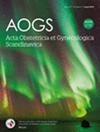Prevalence and impact of vasomotor symptoms associated with menopause among Nordic women: Subgroup analysis from an international cross-sectional survey
Abstract
Introduction
The objectives of this study were to evaluate the prevalence and impact of moderate to severe vasomotor symptoms (VMS) on quality of life, sleep, work, and daily activities. We also assessed treatment patterns for VMS, lifestyle changes to mitigate VMS, and attitudes toward available treatments and menopause.
Material and Methods
Women from Denmark, Finland, Norway, and Sweden aged 40–65 years completed an online survey as part of a larger multinational study. The primary outcome, prevalence of moderate to severe VMS, was assessed in postmenopausal women. Secondary outcomes, including the impact of VMS on quality of life (Menopause-Specific Quality of Life [MENQoL] questionnaire), sleep (Patient-Reported Outcomes Measurement Information System [PROMIS] Sleep Disturbances-Short Form 8b), and work and daily activities (Work Productivity and Activity Impairment [WPAI] questionnaire) were assessed in perimenopausal and postmenopausal women experiencing ≥1 moderate to severe hot flush per day in the prior month. Additionally, survey questions evaluated treatment patterns, lifestyle changes, and opinions toward VMS treatment and menopause in perimenopausal and postmenopausal women.
Results
Among 6383 postmenopausal women (primary analysis population), 739 (11.6%) experienced moderate to severe VMS regardless of whether they were receiving treatment. Among 863 symptomatic perimenopausal and postmenopausal women (secondary analysis population), VMS impaired quality of life and sleep. Work and daily activities were impaired by 24.2% and 30.6%, respectively. Around 35% of women sought advice; however, most women (>60%) reported not taking any treatment for VMS. Among those treating VMS, supplements and nonprescription medications were the most common treatments (19.2%); 12.9% of women reported taking menopausal hormone therapy. As many as 54.3% of women reported taking over-the-counter treatments; 77.8% adopted lifestyle changes to mitigate VMS. One in 4 women (25.6%) expressed concerns about menopausal hormone therapy side effects; 49.5% of women who had used nonmenopausal hormone therapy prescription medication stopped for lack of efficacy. Many women strongly agreed that menopause is a natural part of aging.
Conclusions
Over 10% of postmenopausal Nordic women reported suffering from moderate to severe VMS. VMS impaired the quality of life, sleep, work productivity, and daily activities among perimenopausal and postmenopausal Nordic women, emphasizing the need for effective and well-tolerated treatments.




 求助内容:
求助内容: 应助结果提醒方式:
应助结果提醒方式:


